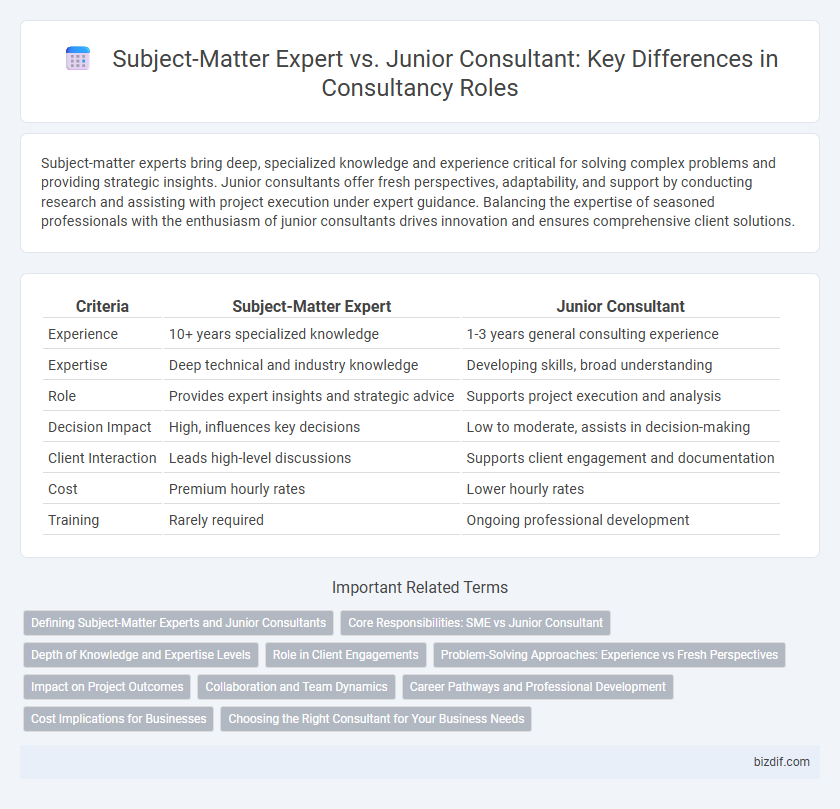Subject-matter experts bring deep, specialized knowledge and experience critical for solving complex problems and providing strategic insights. Junior consultants offer fresh perspectives, adaptability, and support by conducting research and assisting with project execution under expert guidance. Balancing the expertise of seasoned professionals with the enthusiasm of junior consultants drives innovation and ensures comprehensive client solutions.
Table of Comparison
| Criteria | Subject-Matter Expert | Junior Consultant |
|---|---|---|
| Experience | 10+ years specialized knowledge | 1-3 years general consulting experience |
| Expertise | Deep technical and industry knowledge | Developing skills, broad understanding |
| Role | Provides expert insights and strategic advice | Supports project execution and analysis |
| Decision Impact | High, influences key decisions | Low to moderate, assists in decision-making |
| Client Interaction | Leads high-level discussions | Supports client engagement and documentation |
| Cost | Premium hourly rates | Lower hourly rates |
| Training | Rarely required | Ongoing professional development |
Defining Subject-Matter Experts and Junior Consultants
Subject-matter experts possess deep specialized knowledge and extensive experience in a specific industry or technical area, enabling them to provide high-level insights and strategic recommendations. Junior consultants typically have foundational consulting skills and limited domain expertise, contributing primarily through research, analysis, and supporting senior team members. The distinction lies in the depth of expertise and level of responsibility, with subject-matter experts driving expert advisory roles while junior consultants focus on learning and execution.
Core Responsibilities: SME vs Junior Consultant
Subject-matter experts (SMEs) provide deep technical knowledge, lead complex problem-solving, and develop strategic recommendations based on extensive industry experience. Junior consultants primarily support project execution by gathering data, conducting initial analysis, and assisting in client communications under the guidance of senior team members. SMEs focus on high-level advisory and decision-making, while junior consultants handle foundational research and operational tasks.
Depth of Knowledge and Expertise Levels
A subject-matter expert possesses deep, specialized knowledge and extensive experience in a specific domain, enabling precise problem-solving and strategic guidance. In contrast, a junior consultant has a broader but more superficial understanding, often requiring supervision and ongoing learning to develop expertise. The depth of knowledge in subject-matter experts significantly enhances project outcomes through authoritative insights, unlike junior consultants who contribute primarily through foundational analysis and support.
Role in Client Engagements
Subject-matter experts bring deep industry knowledge and specialized skills to client engagements, enabling them to provide strategic insights and solve complex problems effectively. Junior consultants support project execution through data gathering, initial analysis, and administrative tasks while learning client dynamics and methodology frameworks. Their complementary roles ensure comprehensive service delivery, balancing expert guidance with detailed operational support.
Problem-Solving Approaches: Experience vs Fresh Perspectives
Subject-matter experts leverage years of industry experience and deep knowledge to provide precise, proven problem-solving strategies, often anticipating challenges based on historical context. Junior consultants contribute fresh perspectives and innovative approaches, applying recent methodologies and creative thinking to complex problems. Combining the seasoned insights of experts with the dynamic viewpoints of juniors enhances overall consultancy effectiveness by balancing reliability with innovation.
Impact on Project Outcomes
Subject-matter experts provide critical depth of knowledge that significantly enhances project accuracy, risk mitigation, and strategic decision-making. In contrast, junior consultants contribute through execution support and fresh perspectives but typically have limited influence on high-stakes project outcomes. Leveraging subject-matter expertise is essential for achieving superior quality, efficiency, and client satisfaction in complex consultancy projects.
Collaboration and Team Dynamics
Subject-matter experts bring deep industry knowledge and specialized skills that enhance team decision-making and problem-solving. Junior consultants contribute fresh perspectives and adaptability, fostering dynamic collaboration within project teams. Effective teamwork balances the expert's experience with the junior consultant's eagerness to learn, driving innovation and successful client outcomes.
Career Pathways and Professional Development
Subject-matter experts (SMEs) possess deep industry knowledge and specialized skills, often leading strategic initiatives and mentoring junior consultants to accelerate their growth. Junior consultants build foundational consulting competencies through hands-on project experience and training, positioning themselves for advancement to more specialized or senior roles. Structured career pathways and continuous professional development programs are essential to transition junior consultants into effective subject-matter experts and advisory leaders.
Cost Implications for Businesses
Subject-matter experts bring deep industry knowledge and specialized skills, often resulting in higher hourly rates but delivering precise, high-impact solutions that reduce long-term costs. Junior consultants typically charge lower fees and handle routine tasks but may require extended project timelines and additional oversight. Balancing expertise levels with budget constraints is crucial for businesses seeking cost-effective consultancy without compromising quality.
Choosing the Right Consultant for Your Business Needs
Selecting between a subject-matter expert and a junior consultant depends on the complexity and scope of your business needs. Subject-matter experts bring specialized knowledge and years of experience, ideal for strategic decision-making and solving industry-specific challenges. Junior consultants offer cost-effective support for data gathering, basic analysis, and implementation under guidance, making them suitable for smaller projects or tasks requiring less expertise.
Subject-matter expert vs Junior consultant Infographic

 bizdif.com
bizdif.com